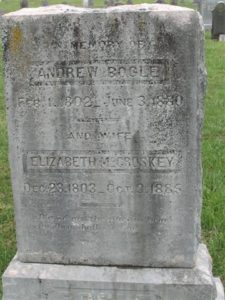National Society Daughters of the American Revolution
The Daughters of the American Revolution is a non-profit, non-political volunteer women’s service organization dedicated to preserving American history, securing America’s future through better education, and promoting patriotism. Founded in 1890, it is comprised of over 175,000 members in 3,000 chapters in all 50 states and Washington, D.C. Its objectives are historic preservation, promotion of education, and patriotic endeavor.
If you can claim lineal descent from a Revolutionary War patriot, you may qualify to join the National Society Daughters of the American Revolution (NSDAR).
Visit the National Society’s website (www.dar.org) by clicking on the NSDAR links to find out more about the requirements for membership and the wonderful works of the DAR.
Celebrate God, Home, and Country, by joining us.
Andrew Bogle, Patriot

The decision was made to name the chapter for Andrew Bogle, from whom the organizing regent was descended.
Now, who was Andrew Bogle, and from whence did he come? We surely need to know something of the man for whom we have named ourselves. The name Bogle is Scottish and means ghost.
Joseph Bogle’s will was written on December 14, 1789. When it was probated in Knox County, North Carolina (now Tennessee), on July 17, 1792, six of his children were living.
The Reverend Samuel Thompson married Andrew Bogle to Elizabeth Campbell, daughter of Hugh Campbell of York County, Pennsylvania, on May 24, 1774, in York County, Pennsylvania. Ramsey wrote in his Annals of Tennessee that Andrew gave the land in Knox County, North Carolina, for the Eusebia Church, which he established (eight miles northeast of Maryville, Blount County, Tennessee) and supported as long as he lived. Eusebia, a Scotch-Irish Presbyterian Church, was at Bogle Settlement. The Bogles moved to Blount County, North Carolina, around 1784-1786.
The Territorial Assembly met on the last Monday in June, 1795, to discuss the possibility of forming the territory into a state and to take the proper steps to effect it. The machinery of Blount County was set into motion in September, 1795. Andrew and two others were appointed judges for election of delegates to the State Constitutional Convention. In 1796, John Sevier, Governor of Tennessee, appointed Andrew as one of the Justices of the Peace. Andrew Bogle died November 29, 1813, in Blount County and is buried at Eusebia Church with most of his family.
Andrew not only served his God, he also served his country. In 1776, he served with Captain James Miller’s 4th Company, Cumberland County Militia, 6th Battalion. In October of 1777, he served with Captain John Hamilton’s Company, Cumberland County, 5th Class of Militia.
In 1778, he served with Captain Thomas Askey’s Company, 6th Battalion, Cumberland County Militia. In 1781, he was under Colonel James Dunlop in the 8th Company Cumberland County Militia; and on August 1, 1782, while serving with Colonel Dunlop, he was mustered out. The only records found among his papers list him as a private.
During the Revolution, his family lived at Cumberland County, Pennsylvania, and Rockingham, Virginia.
[Taken from the Andrew Bogle Chapter Yearbook, copyright by the Andrew Bogle Chapter, NSDAR, all rights reserved.]
Lineage Research
In The Shade of the Family Tree
Emerson once said “there is no history, only biography.” Think, for a moment, about the power behind those words. Our wonderful history as a people is based on the actions of some very special individuals: our patriot ancestors.
Our past is like a great forest of family trees, isn’t it?
Lineage research for membership in the National Society Daughters of the American Revolution (DAR) is two part: first, establishing a link, generation by generation, back to your patriot; and second, to determine what service or support he or she may have rendered.
If your family can trace back to those turbulent times, it is highly likely that they had a hand in the struggles of American independence. And soldiers weren’t the only people needed to assist our cause! Colonial government needed leaders to step forward and organize the fledgling country. Troops needed to be fed, animals needed care and boarding, money was required, and the public at large desperately needed to be inspired and reminded of why we risked so much – so a fiery speech from the pulpit was a special assistance to the soldiers.
Our Membership and Lineage Research Committees can help you move toward membership and even provide information about how to complete the genealogical research needed for your DAR application.
As the generations unfold, linking you to that family member from long ago, you’ll find a comfortable seat beneath that special family tree.
My friends, we’re history!
(P.S. One more thing…we can’t help you, unless we know who you are – so contact us by using the email button on this page.)
